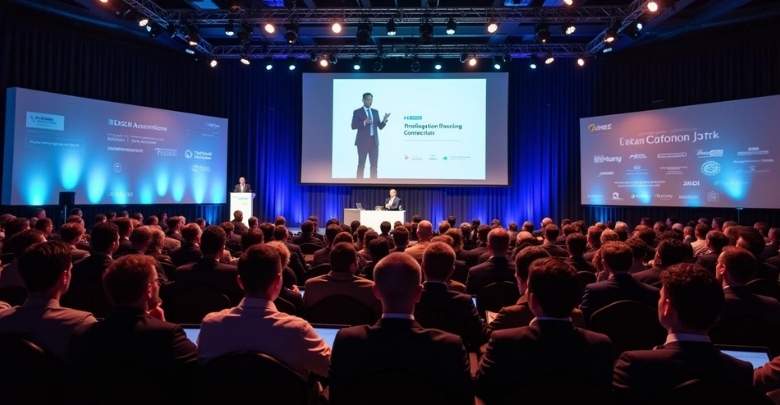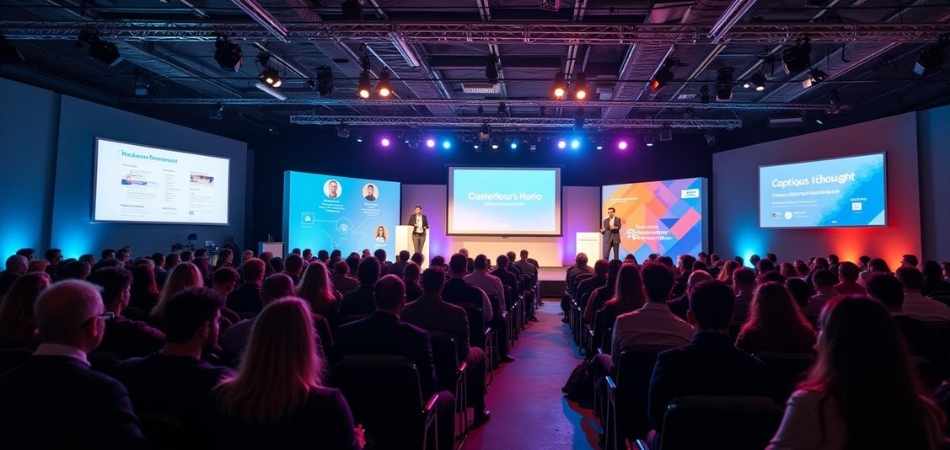Environmental sustainability conferences bring together individuals and organizations passionate about protecting our planet. These events are spaces for sharing ideas, building networks, and exploring innovative solutions. You might be now asking who should join an environmental sustainability conference.
Environmental sustainability conferences attract a diverse range of participants, including policymakers, researchers, business leaders, and students. Each attendee finds value in learning, networking, or advancing their efforts in sustainability. Whether it’s about implementing green technologies or raising community-driven initiatives, these conferences are for everyone committed to making a difference.
Are you curious to know if these events are right for you? Keep reading to explore who benefits from attending, what they gain, and why these events are crucial for advancing global sustainability efforts.
Why Are Environmental Sustainability Conferences Important?
Environmental sustainability conferences play a crucial role in addressing global environmental challenges by encouraging collaboration among scientists, policymakers, and activists. These events serve as platforms to exchange ideas, share innovative solutions, and discuss the latest research to mitigate environmental degradation. They inspire actionable change, emphasizing the urgency of adopting sustainable practices for a healthier planet.
Sustainability conferences are held worldwide and focus on regional and global perspectives. In Europe, forums focus on renewable energy and eco-friendly urban planning, while events in Asia explore sustainable agricultural practices and climate resilience. Africa emphasizes biodiversity conservation and water management, showcasing the diverse priorities shaped by geographical and cultural contexts.
Canada, a leader in environmental advocacy, frequently hosts impactful conferences. The upcoming environmental sustainability conference in Canada will unite global experts to share insights and strategies for tackling climate change and promoting sustainability. Such events underline the importance of collective efforts for a sustainable future.
Who Should Join an Environmental Sustainability Conference?
Environmental sustainability conferences attract individuals and organizations committed to addressing global environmental challenges. These events provide a platform for learning, collaboration, and innovation. Here’s an overview of who can benefit from participating in these important events.
Policymakers and Government Officials
Policymakers and government representatives play a crucial role in developing and implementing environmental policies. Attending these conferences provides them with insights into the latest research and successful case studies. They gain a deeper knowledge of how to integrate sustainable practices into regulations and drive impactful change. These events also connect them with global leaders who are tackling similar issues, promoting international cooperation.
Environmental Scientists and Researchers
Environmental sustainability conferences are ideal for scientists and researchers looking to share their findings and explore new directions. These events create collaboration across disciplines, helping attendees refine their studies. The exchange of ideas at these conferences also inspires innovative solutions to pressing environmental challenges. Researchers can also discover funding opportunities and resources for advancing their work.
Corporate Leaders and Business Professionals
Corporate leaders aiming to integrate sustainability into their operations find immense value in these conferences. Sessions on green technologies, supply chain sustainability, and circular economy principles offer actionable insights. Businesses can connect with experts and gain knowledge on how to align profitability with environmental responsibility. They also gain inspiration from case studies of successful sustainability initiatives implemented by industry peers.
Non-Profit Organizations and Advocacy Groups
Nonprofits and advocacy groups dedicated to environmental causes benefit from the exposure and networking opportunities these events offer. An environmental sustainability conference serves as a space to amplify their initiatives, collaborate with like-minded organizations, and access the latest resources for driving their missions forward. These conferences also help them connect with potential donors and supporters to expand their reach.
Educators and Academic Professionals
Educators and academic professionals attending these conferences gain insights to enrich their curriculum and engage students effectively. They learn about the latest research, teaching tools, and global best practices. These insights empower them to cultivate the next generation of environmentally conscious leaders. Additionally, they can collaborate with peers on educational programs focused on sustainability.
Students and Young Professionals
Students and early-career professionals eager to make a difference in sustainability find these conferences invaluable. Attending workshops and networking sessions helps them gain real-world insights and connect with mentors. They can also discover career opportunities in environmental science, green technologies, and policy advocacy. Participation in these events often upgrades their resumes and professional portfolios.
Technology Innovators and Startups
Technology innovators and startups exploring eco-friendly solutions can showcase their work and learn from industry leaders at these events. Conferences often include dedicated sessions for innovative technologies addressing climate change and resource management. These platforms help innovators scale their ideas and find strategic partners. They can also pitch their ideas to investors who are looking for sustainable solutions to support.
Community Leaders and Local Organizations
Community leaders and grassroots organizations working on local sustainability projects find these events inspiring. They can share their success stories, learn from global initiatives, and apply best practices in their communities. This engagement facilitates a sense of global-local collaboration for impactful change. Conferences also provide them with tools and strategies to engage their communities more effectively.
Key Benefits of Attending Sustainability Conferences
Sustainability conferences provide opportunities for individuals and organizations to engage in meaningful discussions and explore actionable solutions to environmental challenges. These events encourage innovation, networking, and learning in a collaborative setting. Here are the key benefits of attending such conferences.
Gain Cutting-Edge Insights
Sustainability conferences feature leading experts who share the latest research, strategies, and case studies. Attendees gain access to in-depth knowledge about pressing environmental issues, such as climate change, renewable energy, and sustainable business practices. These insights help professionals and organizations stay ahead in adopting effective sustainability solutions.
Expand Your Professional Network
Networking opportunities are a major highlight of sustainability conferences. Attendees can connect with industry leaders, policymakers, researchers, and other professionals who share a passion for sustainability. These connections often lead to collaborations, mentorship opportunities, or partnerships for innovative projects. Building a diverse network of contacts boosts professional growth and opens doors to new opportunities.
Discover Emerging Technologies
Many sustainability conferences showcase groundbreaking technologies designed to address environmental challenges. From renewable energy solutions to advancements in waste management and green construction, these events highlight tools and innovations that are transforming industries. Attendees can explore these technologies firsthand, learn their applications, and consider how they can be integrated into their work or initiatives.
Improve Organizational Practices
For businesses and organizations, attending sustainability conferences provides actionable insights into enhancing their environmental practices. Sessions on topics like carbon footprint reduction, circular economy strategies, and resource optimization guide attendees in improving operations. These changes not only contribute to environmental responsibility but also align with consumer demand for sustainable products and services.
Promote Collaborative Solutions
Sustainability conferences often encourage collaboration among diverse attendees to tackle complex environmental problems. Interactive workshops and brainstorming sessions allow participants to share their knowledge and develop innovative strategies together. These collaborative efforts amplify the impact of sustainability initiatives and promote interdisciplinary approaches to challenges.
Access Funding and Partnership Opportunities
Organizations and startups exploring sustainability solutions often find potential investors and collaborators at these events. Conferences provide platforms for pitching ideas, showcasing projects, and networking with stakeholders who can offer financial or strategic support. This exposure can accelerate the growth and impact of sustainability-focused ventures.
Boost Personal and Professional Development
Attending a sustainability conference boosts both personal and professional growth. Learning from experts, engaging in discussions, and gaining new perspectives broaden participants’ awareness of sustainability. These experiences empower attendees to become more effective advocates for environmental stewardship in their personal lives and professional roles.
How to Prepare for an Environmental Sustainability Conference?
Preparing for an environmental sustainability conference ensures that you make the most of the experience. Proper preparation helps you engage meaningfully, network effectively, and gain valuable insights. Here are essential steps to help you get ready.
Research the Event Agenda
Start by reviewing the event’s schedule to identify sessions, panels, or workshops that align with your goals. Look for speakers and topics that interest you, and note the timings to avoid missing anything important. Knowing the agenda in advance allows you to prioritize and manage your time effectively.
Set Clear Objectives
Define what you hope to achieve by attending the conference. Whether it’s networking, learning about new technologies, or exploring policy updates, having clear objectives helps you stay focused. This clarity also enables you to choose the right sessions and make the most of your interactions with fellow attendees.
Pack Essentials for the Event
Prepare a checklist of items to bring, such as notebooks, pens, business cards, and chargers for your devices. If you’re presenting or exhibiting, ensure all materials are organized and ready. Comfortable clothing and footwear are essential for navigating long conference days, especially if the event includes site tours or outdoor activities.
Plan for Networking
Networking is a major component of sustainability conferences. Research attendees, speakers, or organizations you want to connect with and prepare talking points or questions. Having a polished LinkedIn profile and bringing plenty of business cards ensures you leave a strong impression. Being proactive in networking sessions can lead to valuable collaborations and partnerships.
Review Key Topics in Advance
Stay informed about the conference’s main themes by reading articles, reports, or case studies related to the event topics. Familiarity with current trends and issues in sustainability will enable you to engage in meaningful discussions. It also boosts your confidence when interacting with industry leaders and experts.
Budget Wisely
Plan your expenses by considering travel, accommodation, meals, and registration fees. If you’re unsure, inquire whether the cost to attend an environmental sustainability conference covers additional perks like workshops or post-event resources. Proper budgeting helps ensure you’re financially prepared and can focus on the event without stress.
Follow Up After the Event
After the conference, follow up with contacts you made through emails or LinkedIn. Revisit your notes and implement the insights you gained during the sessions. Sharing your experience with colleagues or posting on social media helps you reflect on the event and keep the conversation going.
Frequently Asked Questions
Environmental sustainability conferences serve a wide array of participants, from professionals and students to community advocates. These events are significant for anyone passionate about addressing global environmental challenges. Below are some frequently asked questions to help guide potential attendees.
Can Environmental Enthusiasts with No Professional Background Attend These Conferences?
Yes, many sustainability conferences welcome individuals without professional experience. Passionate attendees can learn about sustainable practices, connect with experts, and discover ways to contribute to environmental causes in their personal lives. These events often include beginner-friendly sessions and community-focused workshops.
Are Environmental Sustainability Conferences Suitable for Small Business Owners?
Absolutely. Small business owners can benefit from insights into sustainable practices, such as reducing waste or implementing green technologies. These events provide practical strategies to align business operations with environmental goals while improving brand reputation and meeting consumer demand for sustainability.
How Can Artists and Creatives Contribute to Sustainability Conferences?
Artists and creatives play an essential role in raising awareness and inspiring action through their work. At sustainability conferences, they can showcase projects, collaborate with environmental organizations, or participate in sessions on art’s impact in promoting sustainability. Creativity often serves as a bridge between science and public engagement.
Are These Conferences a Good Fit for Non-Governmental Organizations (NGOs)?
Yes, NGOs focused on environmental causes can benefit greatly from attending. Conferences provide opportunities to collaborate, network with potential partners, and amplify their missions. NGOs can also learn from case studies, explore funding opportunities, and improve their advocacy efforts through shared resources.
Can Parents and Educators Attend to Learn About Teaching Sustainability?
Certainly. Parents and educators can gain valuable knowledge about sustainability practices and education. These conferences often include sessions focused on integrating sustainability into school curricula or family activities. Attending helps them inspire the next generation of environmentally conscious citizens.
Final Thought
Environmental sustainability conferences serve a wide audience, including policymakers, business leaders, educators, and community advocates. These events provide valuable knowledge and connections for anyone eager to contribute to environmental progress. If you’ve wondered who should join an environmental sustainability conference? The answer is anyone passionate about sustainability.
To make the most of these events, plan ahead by setting clear goals, researching sessions, and preparing to network effectively. Engage with attendees and apply what you learn to your initiatives. Best wishes as you take steps toward meaningful participation and impactful contributions to a more sustainable future!








